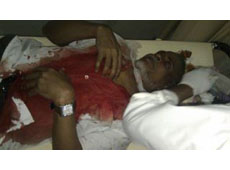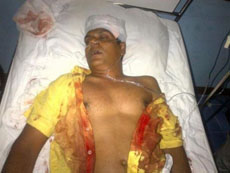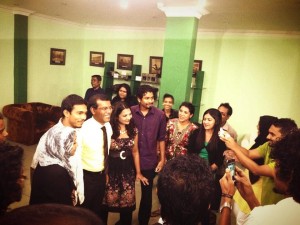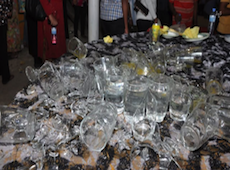Failure to prosecute police officers accused of human rights abuses and “serious failings in the justice system entrenched impunity” in the Maldives during the past year, Amnesty International has said in its annual report.
“These [failings] included the absence of codified laws capable of providing justice equally to all and the appointment of judges who lacked formal training in law without serious scrutiny of their legal qualifications,” the international human rights organisation stated.
“Throughout the year, authorities were accused of political bias for fast-tracking the prosecution of opposition supporters accused of criminal behaviour during rallies while failing to prosecute police and others suspected of committing human rights abuses during the same protests.”
The 2013 Amnesty annual report on the state of the world’s human rights observed that former President Mohamed Nasheed’s resignation on February 7, 2012 was “followed by months of protest and political repression.”
Nasheed resigned in the wake of a violent mutiny by Special Operations (SO) police officers, who assaulted government supporters, ransacked the ruling party’s Haruge (meeting hall), staged a protest at the Republic Square, vandalised the police headquarters, clashed with the military and stormed the state broadcaster.
Since the transfer of presidential power, the security services have used excessive force “to suppress demonstrations that were largely peaceful,” the report noted.
In June 2012, the Maldives Police Service (MPS) however denied “in the harshest terms” allegations of police brutality by Amnesty International.
“Supporters of the former President’s Maldivian Democratic Party (MDP) were targeted for attack in February. Detainees were subjected to torture and other ill-treatment,” the report continued.
“Targeted violence” against MDP members plunged the nation into “a human rights crisis” in February 2012, the Amnesty report contended.
“Throughout the year, security forces frequently attacked peaceful demonstrators, including MPs, journalists and bystanders, in the capital Malé or in Addu, both MDP strongholds. Officers clubbed them, kicked them and pepper-sprayed them directly in the eyes. Around the time of Mohamed Nasheed’s resignation, from 7 to 9 February, police targeted senior MDP members for attack and tracked down and assaulted injured protesters in hospitals,” read the report.
Amnesty also reported torture and ill-treatment in police custody, including “beatings, pepper-spraying the eyes and mouth, denial of drinking water and, in Addu, incarceration in dog cages.”
The report noted that a Commonwealth-backed Commission of National Inquiry (CoNI) established by President Dr Mohamed Waheed – which found that Nasheed resigned voluntarily – had taken note of “allegations of police brutality and acts of intimidation” and called for “investigations to proceed and to be brought to public knowledge with perpetrators held to account.”
Criminal proceedings have however yet to begin against a single police officer accused of human rights abuses in the aftermath of February 7.
Impunity
 In August 2012, the Human Rights Commission of Maldives (HRCM) concluded that the police crackdown on a MDP march across Male’ on February 8, 2012 that left dozens of demonstrators injured was “brutal” and “without prior warning.”
In August 2012, the Human Rights Commission of Maldives (HRCM) concluded that the police crackdown on a MDP march across Male’ on February 8, 2012 that left dozens of demonstrators injured was “brutal” and “without prior warning.”
Based on its findings, the HRCM recommended that the Maldives Police Service (MPS) and Police Integrity Commission (PIC) should investigate the “disproportionate” use of force – in violation of police regulations authorising use of less-lethal weapons – and initiate legal action against the responsible officers.
On February 8, thousands of MDP supporters took to the streets after Nasheed declared that his resignation the previous day was “under duress” in a “coup d’etat” instigated by mutinying SO police officers working with the then-opposition and abetted by rogue elements of the military.
The HRCM noted that 32 people filed complaints with the commission concerning varying degrees of injuries sustained in the crackdown and 20 people submitted medical documents of their treatment for injuries.
Among the injuries caused by the police baton charge, the HRCM report noted that several people were bruised and battered, one person fractured a bone in his leg, one person was left with a broken arm and six people sustained head wounds.
Two fingers on the left hand of one demonstrator were crushed, the report noted, and the victim had to undergo treatment at the operating theatre.
The PIC meanwhile revealed in December 2012 that it “recorded 24 individual cases of police brutality related to 7th and 8th February” and completed investigation into 12 cases.
Six cases were sent to the Prosecutor General’s Office (PGO) for criminal prosecution.
“In one more case, though police brutality was proven, there was insufficient evidence to identify the responsible policemen. Investigations of the remaining 12 cases is ongoing, but are expected to be completed soon,” the commission said in a status update.
In February 2013, PIC Chair Dr Abdulla Waheed told parliament’s Government Oversight Committee that it was investigating 29 police officers accused of using excessive force against MDP demonstrators.
The PIC chairperson could not confirm whether the commission’s recommendation to dismiss six officers of the 29 under investigation was acted upon.
He added that five cases were pending despite video evidence of police brutality as the officers could not be identified and 11 additional cases remained stalled over lack of sufficient evidence.
Former PIC Chair Shahinda Ismail had revealed that officers the commission had recommended for suspension had instead been given promotions. Shahinda resigned in October 2012 citing “major difference of opinion” with other members.
“What I’ve seen in the actions of institutions is that they have been giving a lot of space for the police to act with impunity,” she said at the time.

While police baton charged the front of the protest march on February 8, Minivan News observed SO officers charging the crowd from a narrow alley leading to the Maldives Monetary Authority (MMA) building.
The SO officers used obscene language, pointed to and chased after individual MDP activists and severely beat unarmed civilians.
Parts of the attack from the rear were filmed by Al Jazeera, which reported on February 8 that “police and military charged, beating demonstrators as they ran – women, the elderly, dozens left nursing their wounds.”
Former President Nasheed was reported among the injured, and received head injuries during the clashes. He was briefly taken under police custody before being released back into the crowd.
Minivan News also observed several youth with head injuries queuing up for x-rays in the waiting area outside the reception area at the Indira Gandhi Memorial Hospital (IGMH).
One young woman who had gone to IGMH with her sister was being treated for a head wound. A gauze wrapped around her head was spotted with blood, and she claimed the wound was still bleeding as she went in for an X-ray.
“The police were just standing there and suddenly we were being beaten with batons and pepper spray was thrown in our face. They threw us to the ground and kept beating us,” she said.
 The BBC meanwhile reported “a baton charge by police on crowds gathered outside one of the main hospitals.”
The BBC meanwhile reported “a baton charge by police on crowds gathered outside one of the main hospitals.”
“People scattered as officers sprinted towards them silhouetted against the lights of passing traffic,” the BBC’s Andrew North reported from Male’.
“Inside the hospital, dozens of Mr Nasheed’s supporters are still being treated for injuries, following earlier scuffles in the main square. Among them is Reeko Moosa Maniku, chairman of Mr Nasheed’s Maldives Democratic Party – who was with the former president when the clashes broke out. With a large head bandage and his shirt bloodied, he regained consciousness as we arrived. The police said they would kill me, he told us, as they beat me. Another MP was still unconscious in another ward.”
 (0)Dislikes
(0)Dislikes (0)
(0)
